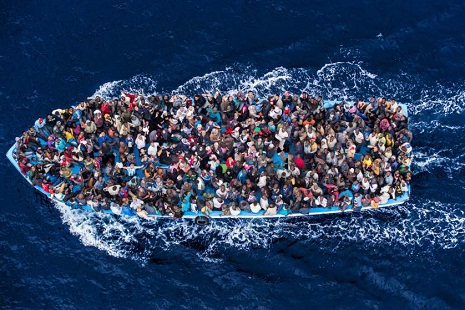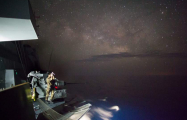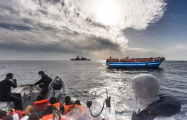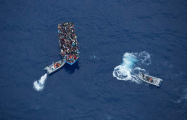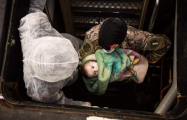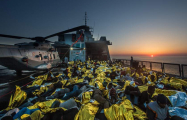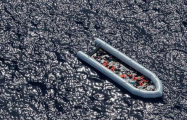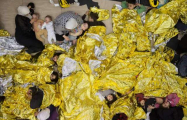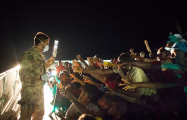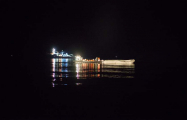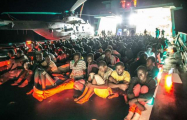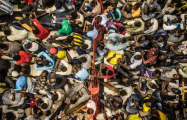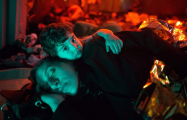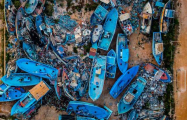Hundreds of people were likely drowned overnight in the Mediterranean when their boat capsized during a desperate attempt to reach Europe, officials said Sunday, deepening a crisis that has shaken politicians as they struggle to cope with the disaster unfolding off Europe’s southern coastlines.
Officials with the U.N. refugee agency, UNHCR, said on Sunday they believed only 28 passengers had survived the capsizing in the Strait of Sicily near the coast of Libya. Survivors who finally reached Italy told the agency their boat tilted, and then sank, after hundreds of passengers rushed to one side to hail a Portuguese merchant ship, which was said to be coming to rescue them and bring them ashore to a European port.
One survivor, a man from Bangladesh, told authorities the boat had a total of 950 people aboard, the Associated Press reports. He also said some 300 people had been locked in the hold by smugglers. The official death toll on Sunday evening was 24, with 28 rescued.
As the scale of the tragedy became clear, French President François Hollande called on E.U. leaders to act to stop the spiraling death toll in the Mediterranean, where by some estimates about 1,500 migrants have drowned this year — most of them in the past week. E.U. officials scrambled to respond to what Hollande called “the worst catastrophe in recent years,” saying that they would call an emergency meeting this week. Speaking on Canal+ Television, Hollande said Europe needed “more boats, more overflights and a much more intense battle against people trafficking.”
But for many, such action will come too late.
This weekend’s huge loss of life is just the latest incident that has now made the Mediterranean the world’s most lethal sea crossing, and by a wide margin, as UNHCR estimates that about 3,419 people drowned last year while trying to make it to Europe. With warmer weather, E.U. officials expect thousands more will try their luck against death-defying odds, cramming into overloaded vessels along the North African coast, especially in Libya, where a network of traffickers have plied their cross-Mediterranean trade for many years.
For the E.U., the migrant crisis is emerging as both a failure of policy, and of the continent’s stated humanitarian values, on which Europe’s leaders have long prided themselves. Those values are now colliding headlong with the upheaval in the Middle East and parts of Africa, which has driven millions to flee. For E.U. leaders, the risk is that helping thousands of boat people could well be seen as welcoming more immigrants to Europe, a highly contentious issue when right-wing parties have campaigned successfully on border restrictions.
Italy has been overwhelmingly hard-hit, since its coast is the closest European landing point from Libya. About 10,000 migrants have landed on Italian land in the past week, and about 200,000 of them arrived last year. Exasperated by the lack of help from his E.U. colleagues, Italian Foreign Minister Paolo Gentiloni said last week that “90% of the cost of the patrol and sea-rescue operations are falling on our shoulders, and we have not had an adequate response from the E.U.”
Indeed, the 28 E.U. countries have failed to agree on a coordinated strategy to stop vessels at sea or have simply devoted so few funds, that whatever strategy they have designed seems doomed to fail. Last year, the E.U.-run Triton search-and-rescue program on the Mediterranean replaced Mare Nostrum, an Italian-led program that had three times as much funding at about €9 million ($9.7 million) a month, compared with Triton’s €3 million ($3.2 million) a month. Under Triton, E.U. patrol boats operate only within 50 km (30 miles) off Italy’s coast — leaving thousands of migrants vulnerable to drowning on the high seas, or closer to North Africa’s coast.
Now with summer approaching, E.U. leaders are arguing over how to share the burden, with the political impasse continuing even as the humanitarian cost mounts. The E.U.’s new commissioner for migration, Dimitris Avramopoulos, says new policies will be up for discussion sometime in May — well into the trafficking season.
Pope Francis appealed this weekend for E.U. leaders and others to do more, just a day after saying the disaster “demands much greater involvement.” On Sunday, he told thousands gathered in St. Peter’s Square for the weekly Angelus address that the migrants at sea “are men and women like us, our brothers seeking a better life, starving, persecuted, wounded, exploited, victims of war.” He added: “They were looking for a better life.”
This past week has been among the worst in recent memory for fleeing migrants and has highlighted how the fate of people on the rickety boats have become embroiled in conflicts raging elsewhere. On Wednesday, a group of Nigerians trying to cross to Europe allegedly threw about 12 Christian passengers overboard after they refused to pray to Allah for help when their fishing boat sprang a leak; the migrants who the passengers said had been responsible were arrested after the group arrived in Italy.
As Italian rescue teams scoured the water for corpses, Italian Prime Minister Matteo Renzi said, shocked, “How can it be that we daily are witnessing a tragedy?”








